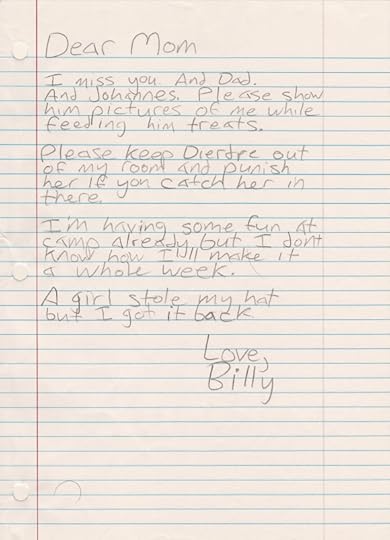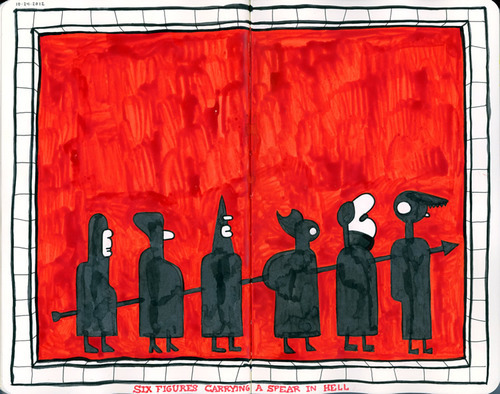Gabe Durham's Blog, page 12
January 8, 2013
The Next Big Thing

It’s sort of a supernatural thriller, if that makes sense? It’s only 18,000 words right now.
This Big Thing thing is a thing. Chris Bundy graciously tapped me to participate. There seems to be some disparity, though, between the sets of questions on different blogs, so I just answered the ones that interested me.
What a nice occasion on which to talk about my new book, FUN CAMP, coming out this spring from Mud Luscious Press. Otherwise I’d be too shy and humble and handsome.
What is the working title of your book?
It’s called FUN CAMP and was always called FUN CAMP.
Where did the idea come from for the book?
I was writing little pieces where speakers held forth. Turned out they were at a summer camp called FUN CAMP.
What genre does your book fall under?
Fraught monologues.
Which actors would you choose to play your characters in a movie rendition?
What if everyone who played our young campers were actors age 70 and up? It’d only work if they were killer actors who completely committed and didn’t play it for laughs OR (and this might be too unethical) they were given the roles without being told that they are playing the parts of children.
Regardless, I’d ask for a cameo as The Man With the Knife in His Eye.
How well would your book adapt into a collectible card game?
That is such a good idea!
What is the one-sentence synopsis of your book?
Fun Camp is told in monologues, speeches, soliloquies, sermons, letters, cards, and lists. It’s about a week at a summer camp that tries to mold campers into more fun and interesting people. Their concept of fun is very slapstick—pranks, food fights, greased watermelon relays—but its leaders are positively evangelical about it. Along the way, you’ll meet Dave and Holly, head counselors who may or may not be getting too old for this shit, Bernadette, a Luddite chaplain with some kids to convert, Billy, a first-timer turning on his parents, and Tad, a popular dude with a Jesus complex.
Will your book be self-published or represented by an agency?
What?
Will your book be made of pulp or are you instead using a letterpress?
What??
Do you have any photographs of yourself in your underpants or will no one ever love you?
I… I guess I could take some photos. I’m just not sure I’m doing it for the right reasons.
I have proof that the things depicted in this book never actually happened to you.
Well it is a novel, so.
Lovely family you got there. Be a shame if anything ever happened to them.
YOU LEAVE MY FAMILY OUT OF THIS.
Too late. And if you want to ever see them again, you’ll answer this next question.
Okay. Fine. Ask it, damn you.
How long did it take you to write the first draft of your manuscript?
Two years, about.
Here is your family back.
Yaaaaaaaayyyyyy y y y y y y y yy y y
To carry on the game, I tag up to and including the following people:
- Ryan Ridge
- Mike Young
- Rachel Glaser
- Todd Dills
- YOUR NAME HERE. [If you feel like doing this thing, let me know and I will replace this text with your name.]

Billy (1 of 11)
January 7, 2013
Chris Bachelder on FUN CAMP: “I celebrate this book for its formal inventiveness, its rich humor, its exuberant language, its genuine spirituality, and most of all for its tender and abiding regard for the oversized feelings of adolescence.”

My first book, FUN CAMP, arrives this spring from Mud Luscious Press with advance praise from one of my favorite fiction writers, Chris Bachelder.
“A less adept writer would flatten summer camp into mere nostalgic idyll or slapstick farce, but Gabe Durham is alive to the tonal complexity of his subject. I celebrate this book for its formal inventiveness, its rich humor, its exuberant language, its genuine spirituality, and most of all for its tender and abiding regard for the oversized feelings of adolescence. Durham knows his pranks, but he is not a prankster. He’s the real thing.” – Chris Bachelder, author of U.S.! and Abbott Awaits
Chris was one of my early readers for this book, and his advice and enthusiasm really pushed the book along to completion.
Here is an interview I did with him about his novel, Abbott Awaits.
You can pre-order FUN CAMP now as part of the 2013 MLP subscription. Subscriptions close at the end of this month.

January 4, 2013
47 Good Movies Currently Available on Netflix Instant

The Queen of Versailles
Tim & Eric’s Billion Dollar Movie
Bernie
I’m Still Here
Battle Royale
RoboCop
Jiro Dreams of Sushi
Capote
The Making of South Park: 6 Days to Air
UHF
Being Elmo
Drive
Clueless
Bill Cunningham New York
Page One: Inside the New York Times
The Thing
Paranormal Activity 2
Paranormal Activity 3
Conan O’Brien Can’t Stop
Reservoir Dogs
Half Nelson
This is Spinal Tap
Eternal Sunshine of the Spotless Mind
Adaptation
Being John Malkovich
Memento
Casa de mi Padre
Wet Hot American Summer
Raising Arizona
Team America: World Police
South Park: Bigger, Longer, and Uncut
Punch-Drunk Love
Winter’s Bone
Mulholland Dr.
True Grit
Chinatown
Brick
Barton Fink
Blue Valentine
Series 7
The Muppet Movie
Bottle Rocket
Me and You and Everyone We Know
Office Space
Paths of Glory
The Conversation
Joan Rivers: A Piece of Work
** BONUS – USED TO BE AVAILABLE, NOW UNAVAILABLE **
The White Ribbon
The Big Lebowski
Babies
Blue Velvet
District 9
Big Fan
Full Metal Jacket
WALL-E
Best in Show


January 3, 2013
Publishing stories is not for the impatient: “The Inaugural Jump” in the The Lifted Brow #15
I.
In the summer of 2006, just after I graduated from Pepperdine, I spent who months living in my stepmom’s family’s home in Bellingham, WA–a lakehouse on Lake Whatcom. I’d written a screenplay in college and thought I ought to try another one, a sci-fi time travel thing. I sketched it out. I wrote scenes. It changed. I seemed to be able to write lots of scenes without any actual time travel occurring. I wondered if that was okay. To my friend Dave (who lived there with me) I said, “If this was a short story and not a screenplay, I could write the whole thing now.”
So I wrote the whole thing out as a short story and not a screenplay. It was 6,000 words, then 10,000 words, then 8,000. Each time I edited it, I saved a new doc. I never do that now. The story was different from every other thing I’d written in that it didn’t suck. I was 22 years old.
In the fall I returned to Los Angeles and applied to 13 grad schools. In every application, I sent the 8,000-word time travel story.
I got engaged.
That spring, the first school I heard back from was an acceptance. They loved the story. They gave me a scholarship. They gave me a 3-year teaching contract. All was going according to plan. The next 12 schools rejected me.
To the school that said yes, I said yes. To the fiance who said yes, I said yes.
I moved to Massachusetts. I sent the story out to lit journals. Everyone said no although Brock Clark liked it. I sent the story out to sci-fi journals. Everyone said no. I went on tear writing stories. I published lots of the newer stories, some of them not as good as this older one.
I wrote a little novel, thought, “Man, that was hard.”
So I wrote an even littler novel with tiny chapters and no real plot to speak of, thought, “This is the best time I’ve ever had writing.” Thought, “Who wants to write short stories when you can do this?”
I moved to Nashville. I edited a journal. I nearly sold a short story collection to a big press. This story, the time travel one, was the longest story in there. Some readers thought it was the best one in the book; some readers thought it was the worst. I thought my best story was the one about 3 guys who worry they’re not sex-obsessed enough.
I continued to send the story out and finally Ronnie Scott accepted it for The Lifted Brow. I was 26. Around the same time, my littler novel was accepted for publication. Both the press and the journal said they’d love to publish it but I’d have to wait awhile. I said, “I dunno.” I said, “Okay.”
I moved back to Massachusetts. I edited a different journal. I wrote a nonfiction book about how weird it is to be alive right now.
I moved back to Los Angeles. Now the story has been published. Maybe another couple of people will read it. Feels like the end and beginning. I am nearly 29. I would like to thank the continent of Australia.
II.
How does time even work anyway?

January 2, 2013
Matt Kish’s “Six Figures Carrying a Spear in Hell”
January 1, 2013
You’re Not Doing It Right by Michael Ian Black
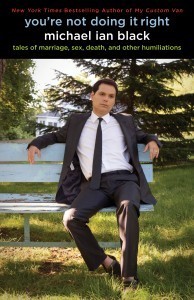
I’ve been watching Michael Ian Black’s career for years now. I root for him. I want him to succeed more than I want most entertainers to succeed. Most of this has to do with my love for his show, Stella, which ran for 10 episodes before getting cancelled in 2005. It was one of those rare shows that presented a fully realized world and consistent tone right out of the gate, and I hold that it is one of the greatest silly shows that has ever been on TV. I’ve seen nothing like it before or since. Michael and Michael Have Issues had some great scenes too–all of them in the “real world,” never in the “sketches”–but never came close to Stella.
What was consistent in all his projects going all the way back to The State was his smarmy class clown persona. It worked for him and he was good at it, and then a couple of years ago he began to talk in interviews about how he was tired of it, wanted to make comedy while remaining himself. I was skeptical.
But now here’s You’re Not Doing It Right, a book of short comedic-depressive essays, schtick successfully dropped, about Black’s lifelong struggle ineptitude, the sense that he didn’t know how to do anything and never would. It’s a feeling I’m familiar with. The book is never better than when he’s writing about his relationship with his wife Martha, contrasting their sneaky sexy dating with together rearing colicky babies that turn into often-boring children. Black’s candid enough in here that you feel like you’re really getting the goods.
Liz read it too, and after we’d both finished we had a long frank talk about Ways Marriage Sucks, each emboldened by a guy who’s said it in harsher words than we even wanted to, and came away happy to have said some of the uglier things we’d been thinking. (We’re much more forthcoming with the nicer things we have to say.)
It occurs to me that this is a thing boring couples do: Read a feelings book and talk about it. But for the record, I’d have never done it if I wasn’t tricked into it by such a funny man.
Rumpus interview re: the book.

The Revolution Was Televised
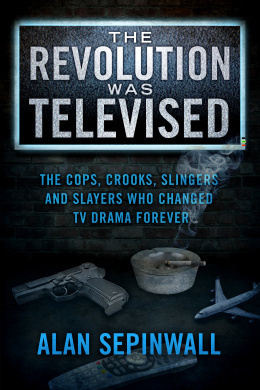
What a fun book this was. (Thanks, Ken, for turning me on to it.) A smart critic shows you, show by show, why The Sopranos, The Wire, Breaking Bad, and Deadwood are so good, interspersing the criticism with stories of the shows’ creation.
He makes a surprisingly good case for the brilliance of Buffy the Vampire Slayer and makes me pretty curious about the Shield. I skipped the chapter on Lost: I’ll never watch it.


December 31, 2012
Tenth of December
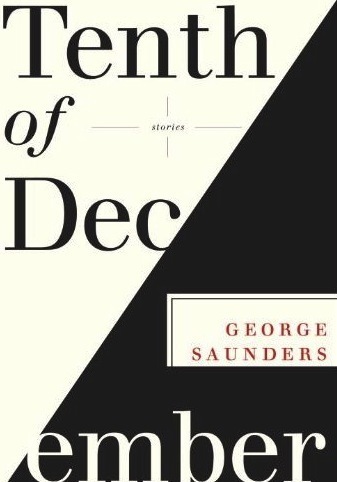
Getting excited for this. I’ve read most of these stories in the New Yorker, but I stopped before reading the last two so I’d have something new to read in the book.
Already, it contains two of my favorite Saunders stories: “Al Roosten” and “Victory Lap.”
If you’ve read “Roosten,” make sure to check out this Justin Taylor essay comparing him to Flannery O’Connor. The essay has stood out in my mind longer than most for how jarring it was to see an article about something I was already actively thinking about, having just read “Roosten.” Namely:
Flannery O’Connor : Catholicism :: George Saunders : Buddhism
But of course that’s a little too tidy.


December 28, 2012
Django Unchained

Django Unchained interests me most as a Christoph Waltz vehicle.
It’s the second Tarantino movie where the very best thing about it is the emphatic, excitable German who cannot wait to show how his command of multiple languages allows him to dominate everyone else. In one of Django’s funniest moments, Waltz is told that the powerful Leonardo DiCaprio is a Francophile and Waltz delightedly begins speaking French fluently, and then is told that Leo doesn’t actually speak French. And so he sadly puts his trick away.
In the first movie, Waltz’s presence made sense. The guy was a Nazi. In this movie, the German is shoehorned into a plot that does not readily accommodate a Roving German Dentist Assassin, but he has to be in the movie because hearing Christoph Waltz speak Tarantino’s words is one of the greatest things to behold in a movie, and Tarantino knows it.
Unfortunately for this Slave Revenge Western, there is only one truly compelling black character in this movie–Samuel L. Jackson–and that’s one less than Pulp Fiction had. Jamie Foxx is at his best when he’s playing roles Waltz created for him, but when he’s back to being himself, he’s a blank badass slate.
That I was wildly entertained throughout is barely worth mentioning. Every frame ached to please, and did, and did, and did.



